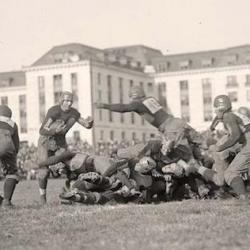Marcia Shoop is extraordinarily well-positioned to reflect on the theological dimensions of contemporary sports. A college athlete with a PhD from Emory University, Shoop is married to John Shoop, a former college quarterback who has coached both in the NFL and the NCAA.
Shoop’s Touchdowns for Jesus bills itself as an apocalyptic look at contemporary big-time sports. She uses “apocalypse” in its original sense: Her book “lifts the veil” on sports, looking at the phenomenon of fan(tasm), sexual stereotyping, racial lines, the place of sports in higher education. She aims to expose and exorcise the demons that dominate big-time sports.
Comparing the American sports stadium to the colisea of antiquity, she observes that the sports stadium is “a world of struggle, of contestation, or rivalries,” in short “a world where the self could be constructed and reconstructed with new challenges and new viewings,” a world that made sense (21). It still is. What she calls sports “fan(tasm)” reflects a “redemptive desire,” a will to have the world make sense, and a will to collapse the world into what is right in front of us.
Shoop is most vivid when describing her own experience in sports—whether in a stadium listening to Chicago Bears fans lambaste her husband or at UNC during an NCAA investigation of the football program. She doesn’t mince words about the NCAA. Students sell their souls by signing a letter of intent and are put in an impossible bind as far as academics are concerned. Meanwhile, coaches are constrained by “the ultimate bully” that is the NCAA, while university officials keep the whole thing going because it’s a gravy train like none other. It’s not a pretty picture.
Though largely written in apocalyptic vein, Shoop knows that sports can be life-enhancing, and she ends with suggestions for “cultivating new practices of redemption” (102)—celebrating the gift of vitality, forging relationships, “ground-breaking,” which means leaving things better than you found it.
The demons Shoop exorcises are trendy targets—sexism and racism, especially. But her informative, sometimes bracing book makes it clear that trendy targets really do need to be exposed.
Correction, added August 7: A previous version of this post stated that John Shoop was an NFL quarterback. The author Marcia Shoop writes: “My husband, John, played quarterback in college, but never in the NFL. He coached quarterbacks in the NFL, but did not play quarterback in the NFL.” My apologies for the mistake.











